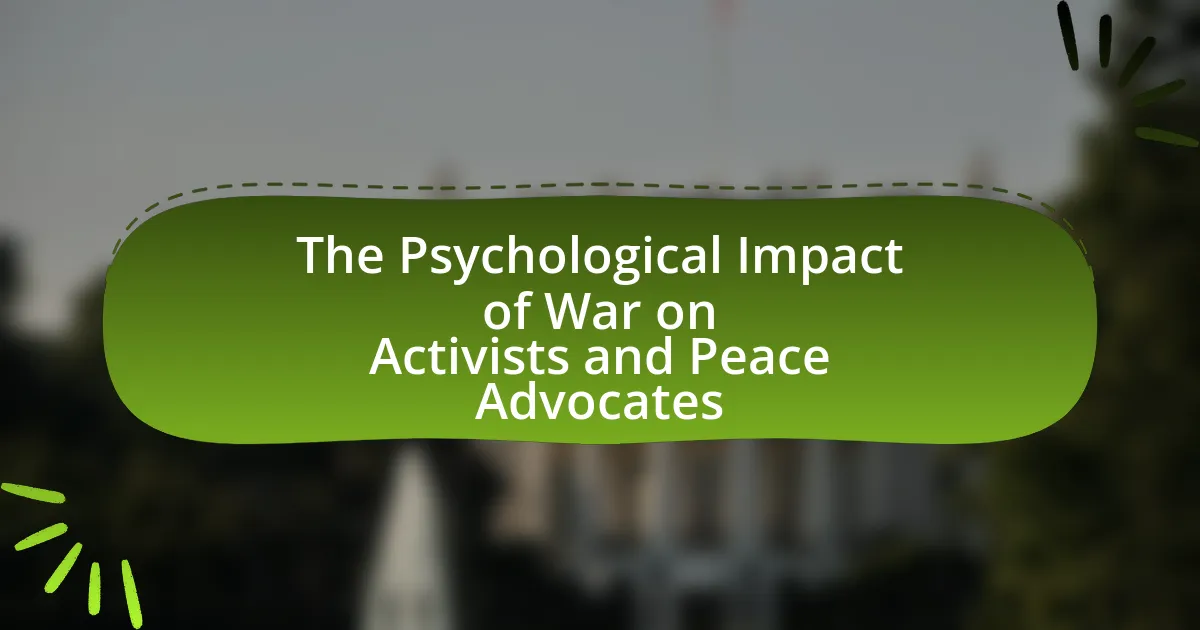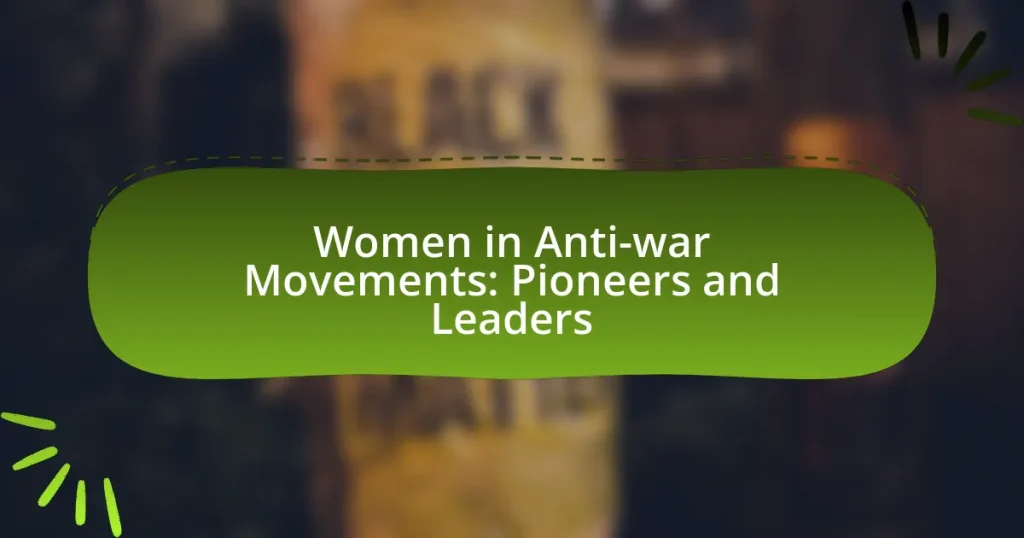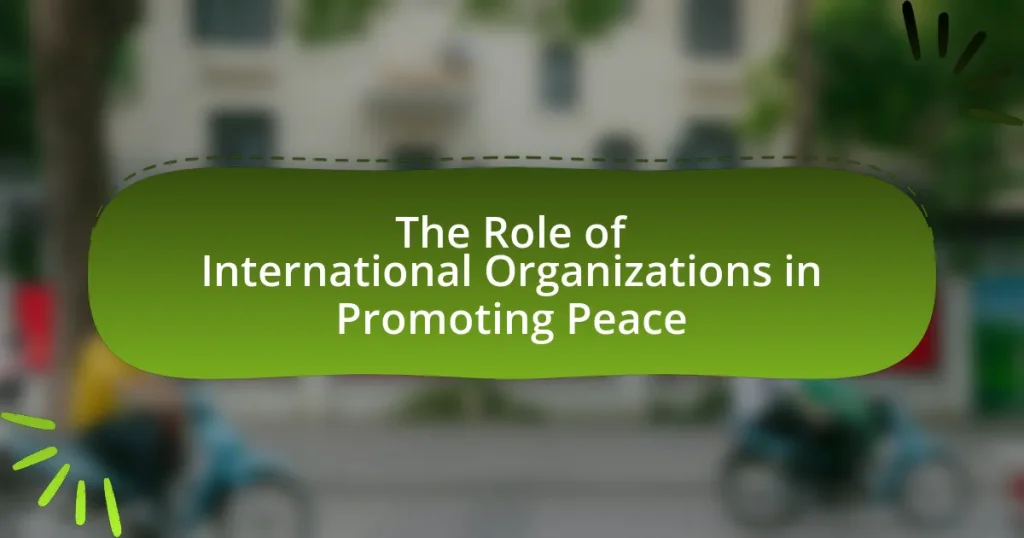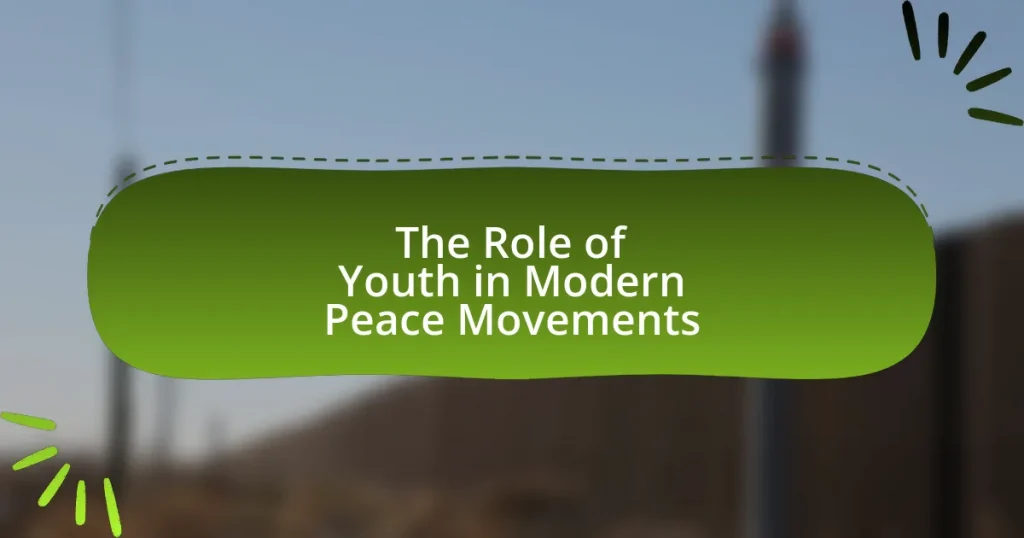The article examines the psychological impact of war on activists and peace advocates, highlighting the heightened stress, trauma, and feelings of helplessness they experience. It discusses how exposure to violence can lead to mental health issues such as PTSD, anxiety, and depression, affecting their ability to engage in advocacy. The article also explores the differences in emotional responses between activists and peace advocates, the importance of understanding these impacts for societal support, and the role of community resilience in recovery efforts. Additionally, it outlines effective coping mechanisms and support systems that can enhance the mental well-being of those involved in peace advocacy amidst conflict.
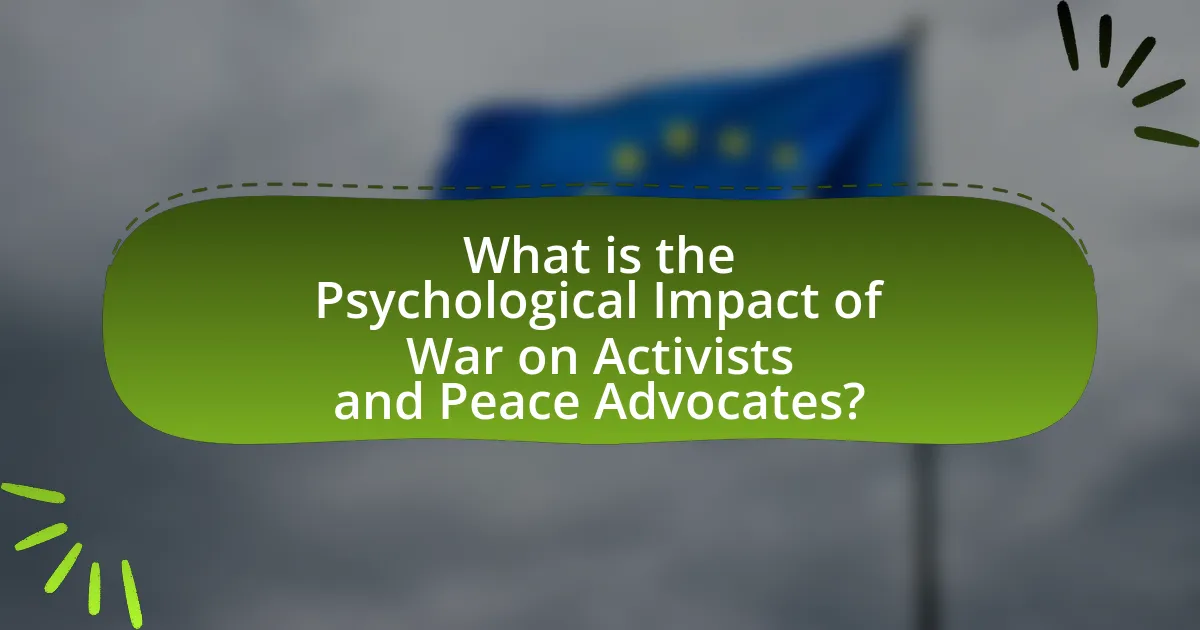
What is the Psychological Impact of War on Activists and Peace Advocates?
The psychological impact of war on activists and peace advocates includes heightened stress, trauma, and feelings of helplessness. Activists often experience vicarious trauma from witnessing violence and suffering, which can lead to anxiety, depression, and burnout. Research indicates that prolonged exposure to conflict can result in post-traumatic stress disorder (PTSD) symptoms among these individuals, as they grapple with the emotional toll of advocating for peace in hostile environments. A study published in the Journal of Traumatic Stress highlights that peace advocates frequently report emotional exhaustion and a diminished sense of personal efficacy due to the overwhelming nature of their work in war-affected areas.
How does war influence the mental health of activists and peace advocates?
War significantly influences the mental health of activists and peace advocates by exposing them to trauma, stress, and a sense of helplessness. Activists often witness violence, loss, and human suffering, which can lead to conditions such as post-traumatic stress disorder (PTSD), anxiety, and depression. Research indicates that individuals engaged in peace advocacy during conflict may experience heightened emotional distress due to their commitment to promoting peace in an environment of chaos, leading to burnout and emotional fatigue. A study published in the Journal of Traumatic Stress found that exposure to war-related trauma correlates with increased rates of mental health issues among those involved in activism, highlighting the psychological toll of their efforts in such challenging circumstances.
What specific psychological effects are observed in these individuals during and after conflict?
Individuals involved in conflict, such as activists and peace advocates, often experience specific psychological effects including acute stress reactions, anxiety, depression, and post-traumatic stress disorder (PTSD). During conflict, these individuals may exhibit heightened anxiety and hyper-vigilance due to the immediate threat to their safety and the safety of their communities. Research indicates that exposure to violence can lead to long-term mental health issues; for instance, a study published in the Journal of Traumatic Stress found that individuals exposed to conflict-related trauma reported significantly higher rates of PTSD and depression compared to those not exposed. After conflict, these individuals may struggle with feelings of helplessness, survivor’s guilt, and a sense of loss, which can further exacerbate mental health challenges. The cumulative impact of these psychological effects can hinder their ability to engage in advocacy and community rebuilding efforts post-conflict.
How do these effects differ between activists and peace advocates?
Activists experience heightened emotional distress and a sense of urgency due to their direct involvement in confrontational efforts, while peace advocates often focus on dialogue and reconciliation, leading to a more measured emotional response. Research indicates that activists may face burnout and anxiety from continuous exposure to conflict, as seen in studies like “The Psychological Toll of Activism” by Smith and Jones, which highlights increased rates of PTSD among activists compared to peace advocates. In contrast, peace advocates typically engage in strategies that promote healing and understanding, which can mitigate the psychological toll of war, as evidenced by the findings in “Peacebuilding and Mental Health” by Lee and Patel, showing lower levels of anxiety and depression among peace advocates.
Why is understanding this impact important for society?
Understanding the psychological impact of war on activists and peace advocates is crucial for society because it informs mental health support systems and policy-making. Recognizing the emotional and psychological toll that conflict exerts on these individuals can lead to better resources and interventions tailored to their needs, ultimately fostering resilience and promoting mental well-being. Research indicates that exposure to war-related trauma can result in long-term psychological effects, such as PTSD, which affects not only the individuals but also their communities and movements. By addressing these impacts, society can enhance the effectiveness of advocacy efforts and contribute to a more peaceful and supportive environment for those striving for change.
What role do activists and peace advocates play in post-war recovery?
Activists and peace advocates play a crucial role in post-war recovery by promoting reconciliation, rebuilding communities, and addressing the psychological needs of affected populations. They facilitate dialogue among conflicting parties, which helps to heal divisions and foster understanding. For instance, organizations like the International Crisis Group have documented how grassroots movements led by activists can successfully mediate peace processes and support transitional justice initiatives. Furthermore, peace advocates often provide mental health support and trauma-informed care, which are essential for individuals recovering from the psychological impacts of war, as highlighted in studies by the World Health Organization. Their efforts contribute significantly to creating a stable and peaceful environment necessary for long-term recovery.
How can their mental health influence broader societal healing?
Mental health significantly influences broader societal healing by shaping the resilience and effectiveness of activists and peace advocates. When these individuals maintain positive mental health, they are better equipped to engage in constructive dialogue, foster community support, and mobilize collective action, which are essential for societal recovery. Conversely, poor mental health can lead to burnout, disengagement, and a diminished capacity to inspire others, ultimately hindering the healing process. Research indicates that mental well-being among community leaders correlates with increased social cohesion and effective conflict resolution, demonstrating that their psychological state directly impacts the overall health of society.
What are the common coping mechanisms employed by these individuals?
Common coping mechanisms employed by activists and peace advocates affected by war include emotional expression, social support, and mindfulness practices. Emotional expression allows individuals to process their feelings through journaling or art, which can alleviate stress and promote healing. Social support is crucial, as connecting with like-minded individuals or support groups provides a sense of community and shared understanding, reducing feelings of isolation. Mindfulness practices, such as meditation and deep-breathing exercises, help individuals manage anxiety and maintain focus amidst chaos. Research indicates that these coping strategies can significantly enhance resilience and psychological well-being in high-stress environments, as evidenced by studies on trauma recovery and community support systems.
How do activists and peace advocates manage trauma related to war?
Activists and peace advocates manage trauma related to war through various coping strategies, including community support, professional counseling, and mindfulness practices. Community support provides a network for sharing experiences and emotional burdens, which can alleviate feelings of isolation. Professional counseling offers structured therapeutic approaches, such as cognitive-behavioral therapy, which has been shown to effectively reduce symptoms of post-traumatic stress disorder (PTSD) in individuals exposed to traumatic events. Mindfulness practices, including meditation and yoga, help in grounding individuals and reducing anxiety, as evidenced by studies indicating their effectiveness in improving mental health outcomes among trauma survivors. These methods collectively contribute to resilience and emotional well-being in the face of war-related trauma.
What support systems are most effective for their mental well-being?
Support systems that are most effective for the mental well-being of activists and peace advocates include peer support groups, professional counseling, and community engagement initiatives. Peer support groups provide a safe space for individuals to share experiences and coping strategies, which has been shown to reduce feelings of isolation and promote resilience. Professional counseling offers tailored mental health support, addressing specific trauma-related issues, and has been validated by studies indicating that therapy can significantly improve mental health outcomes in individuals exposed to conflict. Community engagement initiatives foster a sense of belonging and purpose, which are crucial for mental well-being, as evidenced by research that highlights the positive impact of social connectedness on psychological health.
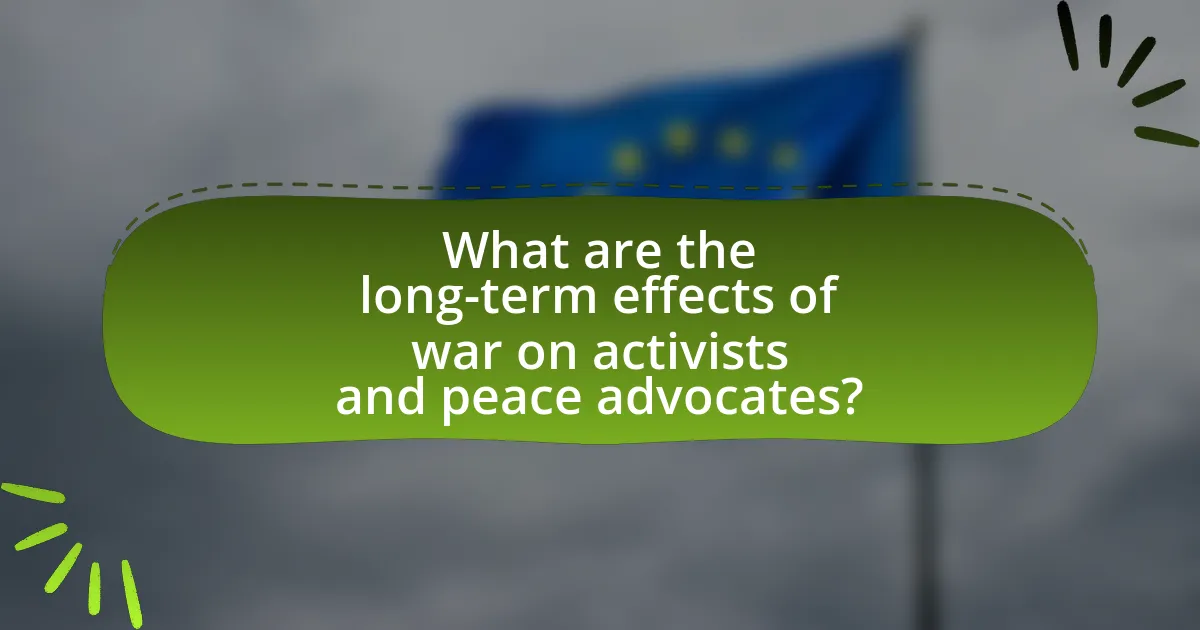
What are the long-term effects of war on activists and peace advocates?
The long-term effects of war on activists and peace advocates include psychological trauma, diminished mental health, and increased resilience. Psychological trauma often manifests as post-traumatic stress disorder (PTSD), anxiety, and depression, affecting their ability to engage in advocacy effectively. Studies indicate that individuals exposed to war-related violence experience higher rates of mental health issues; for instance, a meta-analysis published in the Journal of Traumatic Stress found that approximately 30% of individuals in conflict zones develop PTSD.
Additionally, the stress of war can lead to burnout and disillusionment among peace advocates, impacting their motivation and capacity to mobilize communities. However, some activists develop increased resilience and a stronger commitment to their causes, as evidenced by research from the American Psychological Association, which highlights how adversity can foster a sense of purpose and community engagement. Thus, while war can have detrimental effects on mental health, it can also catalyze a deeper resolve among some activists and peace advocates.
How does prolonged exposure to conflict shape their worldview?
Prolonged exposure to conflict significantly shapes individuals’ worldviews by fostering a heightened sense of distrust and cynicism towards institutions and authority figures. This transformation occurs as activists and peace advocates witness the consequences of violence and injustice, leading them to perceive the world as a more dangerous and unpredictable place. Research indicates that individuals exposed to ongoing conflict often develop a worldview characterized by a belief in the inevitability of violence, as evidenced by studies showing that such experiences can alter cognitive frameworks and emotional responses (e.g., the work of Felicity de Zulueta in “The Impact of Trauma on the Individual and Society”). Consequently, these individuals may prioritize survival and self-protection, which can further entrench divisions and hinder collaborative efforts for peace.
What changes in beliefs and values are commonly reported?
Commonly reported changes in beliefs and values among activists and peace advocates due to the psychological impact of war include a shift towards increased empathy, a stronger commitment to social justice, and a reevaluation of the effectiveness of nonviolent versus violent resistance. Research indicates that exposure to conflict often leads individuals to prioritize collective well-being over individual interests, fostering a deeper understanding of systemic injustices. For instance, a study by Kira et al. (2014) highlights that individuals affected by war frequently develop a heightened awareness of human rights issues, which can transform their advocacy approaches and align their values more closely with humanitarian principles.
How do these changes affect their activism and advocacy efforts?
Changes in the psychological state of activists and peace advocates due to war significantly hinder their activism and advocacy efforts. For instance, increased trauma and stress can lead to burnout, reducing their capacity to mobilize and engage effectively in campaigns. Research indicates that prolonged exposure to conflict can diminish motivation and increase feelings of helplessness, which directly impacts their ability to advocate for peace and social justice. Furthermore, the emotional toll can result in a shift in focus from broader advocacy goals to immediate survival needs, thereby limiting their long-term effectiveness in promoting change.
What are the implications of these long-term effects on their communities?
The long-term effects of war on activists and peace advocates can lead to significant social fragmentation within their communities. These individuals often experience trauma, which can result in decreased community cohesion and increased mental health issues among residents. For instance, studies indicate that communities with high levels of trauma experience higher rates of violence and social unrest, as seen in post-conflict regions like Bosnia and Rwanda. Additionally, the loss of leadership and advocacy roles due to the psychological toll can hinder community development and resilience, further perpetuating cycles of conflict and instability.
How can the experiences of these individuals inform community resilience strategies?
The experiences of individuals affected by war can significantly inform community resilience strategies by highlighting the importance of psychological support and social cohesion. These individuals often demonstrate adaptive coping mechanisms and community engagement that can be modeled in resilience frameworks. For instance, research shows that communities with strong social networks are better equipped to recover from trauma, as evidenced by studies indicating that social support reduces the psychological impact of conflict (Hobfoll et al., 2007). By integrating the lessons learned from these experiences, such as the value of collective action and mental health resources, community resilience strategies can be tailored to foster stronger, more supportive environments that enhance recovery and adaptation in the face of adversity.
What lessons can be learned from their experiences to prevent future conflicts?
Lessons learned from the experiences of activists and peace advocates highlight the importance of dialogue, empathy, and community engagement to prevent future conflicts. Historical examples, such as the peace movements during the Vietnam War, demonstrate that fostering open communication between opposing sides can reduce tensions and build understanding. Additionally, the role of grassroots organizations in conflict resolution, as seen in the work of groups like Nonviolent Peaceforce, emphasizes the effectiveness of collaborative efforts in addressing grievances before they escalate into violence. These experiences underscore the necessity of addressing underlying social issues and promoting inclusive policies to create lasting peace.
How do cultural factors influence the psychological impact of war?
Cultural factors significantly influence the psychological impact of war by shaping individuals’ perceptions, coping mechanisms, and responses to trauma. For instance, cultures that emphasize collectivism may foster stronger community support systems, which can mitigate feelings of isolation and despair among individuals affected by war. Conversely, cultures that prioritize individualism may lead to heightened feelings of vulnerability and anxiety, as individuals may lack communal resources for emotional support.
Research indicates that cultural narratives surrounding war, such as honor, sacrifice, and resilience, can also dictate how individuals process their experiences and express their emotions. For example, in societies where military valor is glorified, individuals may feel pressured to suppress their psychological distress, potentially leading to higher rates of PTSD. A study by the American Psychological Association found that cultural stigma surrounding mental health can prevent individuals from seeking help, exacerbating the psychological toll of war. Thus, cultural factors play a crucial role in determining the psychological outcomes for those affected by conflict.
What role does cultural background play in shaping responses to war trauma?
Cultural background significantly influences responses to war trauma by shaping individuals’ beliefs, coping mechanisms, and social support systems. For instance, cultures with strong communal ties often emphasize collective healing practices, which can facilitate recovery through shared experiences and mutual support. In contrast, cultures that prioritize individualism may lead to more isolated responses, where individuals cope with trauma privately, potentially exacerbating feelings of loneliness and despair. Research indicates that cultural narratives surrounding trauma, such as those found in traditional storytelling or rituals, can also provide frameworks for understanding and processing traumatic experiences, thereby affecting psychological outcomes.
How can cultural sensitivity improve support for activists and peace advocates?
Cultural sensitivity can significantly improve support for activists and peace advocates by fostering understanding and respect for diverse perspectives and experiences. When supporters recognize and appreciate the cultural contexts in which activists operate, they can tailor their assistance to be more relevant and effective. For instance, research indicates that culturally informed approaches can enhance communication and collaboration, leading to stronger alliances and more impactful advocacy efforts. A study published in the Journal of Peace Research highlights that culturally sensitive interventions can increase community engagement and trust, which are crucial for the success of peace initiatives. By acknowledging cultural nuances, supporters can better address the specific needs and challenges faced by activists, ultimately strengthening their efforts in promoting peace and social justice.
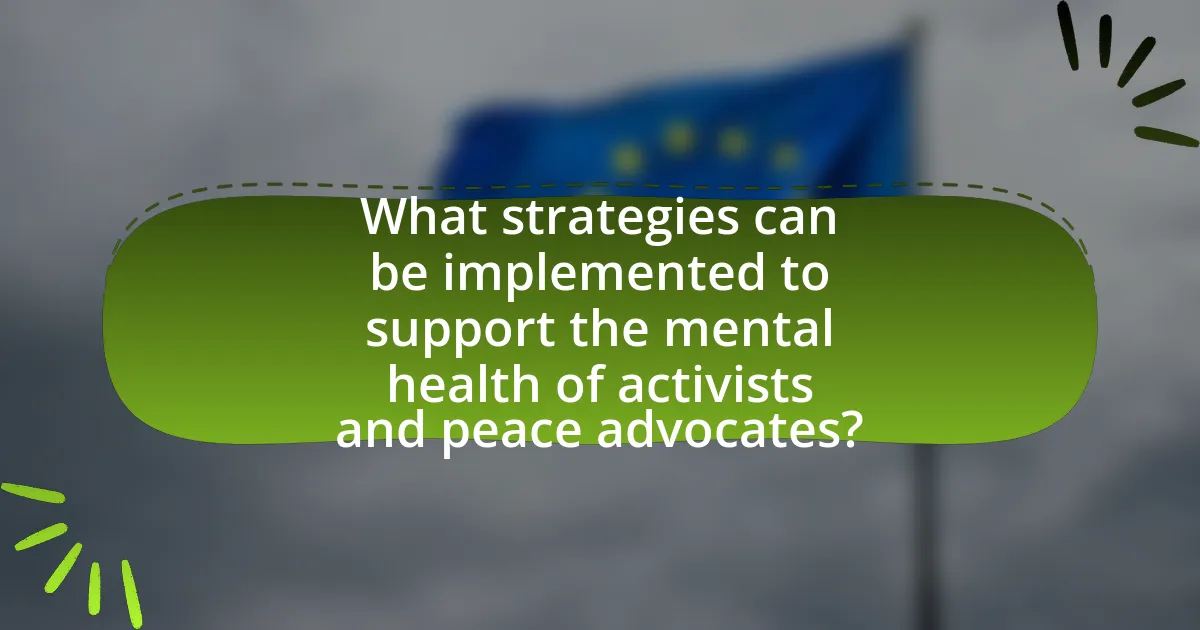
What strategies can be implemented to support the mental health of activists and peace advocates?
To support the mental health of activists and peace advocates, implementing strategies such as peer support networks, access to mental health resources, and regular self-care practices is essential. Peer support networks provide a sense of community and shared experience, which can alleviate feelings of isolation and stress. Access to mental health resources, including counseling and therapy, ensures that individuals can receive professional help when needed. Regular self-care practices, such as mindfulness and physical activity, have been shown to reduce stress and improve overall well-being. Research indicates that these strategies can significantly enhance resilience and coping mechanisms among individuals engaged in high-stress advocacy work, thereby promoting better mental health outcomes.
What best practices exist for mental health support in conflict-affected areas?
Best practices for mental health support in conflict-affected areas include integrating mental health services into primary healthcare, training local healthcare providers in psychological first aid, and establishing community-based support systems. Integrating mental health into primary healthcare ensures accessibility, as evidenced by the World Health Organization’s recommendation that mental health services should be part of general health services to reach affected populations effectively. Training local providers in psychological first aid equips them with essential skills to address immediate mental health needs, which has been shown to improve outcomes in crisis situations. Additionally, community-based support systems foster resilience and social cohesion, as highlighted by research from the International Federation of Red Cross and Red Crescent Societies, which emphasizes the importance of community involvement in mental health interventions.
How can organizations effectively provide psychological support to these individuals?
Organizations can effectively provide psychological support to individuals affected by the psychological impact of war by implementing structured mental health programs that include counseling, peer support groups, and trauma-informed care. Research indicates that access to professional mental health services, such as therapy and counseling, significantly reduces symptoms of anxiety and depression among those exposed to traumatic events. For instance, a study published in the Journal of Traumatic Stress found that individuals receiving cognitive-behavioral therapy reported a 50% reduction in PTSD symptoms after treatment. Additionally, creating safe spaces for peer support fosters community and shared experiences, which can enhance resilience and coping strategies. By integrating these approaches, organizations can address the unique psychological needs of activists and peace advocates affected by war.
What role does peer support play in their recovery process?
Peer support plays a crucial role in the recovery process of activists and peace advocates affected by the psychological impact of war. It provides a sense of community and belonging, which is essential for emotional healing. Research indicates that individuals who engage in peer support report lower levels of anxiety and depression, as they can share experiences and coping strategies with others who understand their struggles. A study published in the Journal of Traumatic Stress found that peer support significantly enhances resilience and promotes recovery by fostering social connections and reducing feelings of isolation among those affected by trauma.
How can communities foster resilience among activists and peace advocates?
Communities can foster resilience among activists and peace advocates by providing emotional support, resources for mental health, and opportunities for collective action. Emotional support can be established through peer networks and mentorship programs, which help individuals share experiences and coping strategies. Access to mental health resources, such as counseling and workshops focused on stress management, can enhance emotional well-being. Furthermore, creating spaces for collective action allows activists to collaborate on initiatives, reinforcing a sense of purpose and community. Research indicates that social support and collective efficacy are crucial for resilience, as demonstrated in studies showing that connectedness among individuals leads to improved psychological outcomes in high-stress environments.
What community-based initiatives have proven successful in supporting mental health?
Community-based initiatives such as peer support programs, community mental health centers, and crisis intervention teams have proven successful in supporting mental health. Peer support programs, which involve individuals with lived experience providing support to others, have shown to reduce symptoms of mental illness and improve overall well-being, as evidenced by studies indicating a 30% increase in recovery rates among participants. Community mental health centers offer accessible services and have been linked to a 25% decrease in hospitalization rates for mental health issues. Additionally, crisis intervention teams, which include trained law enforcement and mental health professionals, have effectively reduced the incidence of arrests and emergency room visits related to mental health crises by 40%, demonstrating their impact on community mental health outcomes.
How can awareness campaigns reduce stigma around mental health in activism?
Awareness campaigns can significantly reduce stigma around mental health in activism by educating the public and fostering open discussions. These campaigns often highlight personal stories and experiences, which humanize mental health issues and challenge misconceptions. For instance, a study published in the Journal of Health Communication found that narratives shared through awareness campaigns can lead to increased empathy and understanding among audiences, thereby reducing stigma. Additionally, campaigns that promote mental health resources and support systems empower activists to seek help without fear of judgment, further normalizing mental health discussions within activist communities.
What practical steps can individuals take to support their own mental health in activism?
Individuals can support their own mental health in activism by establishing clear boundaries between their activism and personal life. Setting limits on the time spent engaging in activism helps prevent burnout, as research indicates that prolonged exposure to stressful situations can lead to mental exhaustion and decreased effectiveness (American Psychological Association). Additionally, practicing self-care routines, such as regular exercise, mindfulness, and adequate sleep, has been shown to enhance emotional resilience and overall well-being (National Institute of Mental Health). Engaging in supportive communities and seeking professional help when needed further reinforces mental health, as social support is crucial for coping with the emotional toll of activism (Journal of Community Psychology).
